
By QUINTON SMITH/YachatsNews.com
When state and local dignitaries gather Thursday to celebrate the opening of a unique low-income housing development in Yachats, its 21 units will already be filled.
And there’s already a waiting list of 40 people.
That’s how needed – and popular – the $6 million Fisterra Garden Townhomes project has proven.
“They filled up immediately and haven’t been empty since Day One,” said Layne Morrill of Yachats, president of Our Coastal Village, the nonprofit developer.
Morrill has spent three years working with state housing officials and pursuing loans, donations and tax credit investors for the project. It’s the culmination of a 10-year effort to bring low-income housing to the Yachats area – and probably his last.
“I have no immediate projects” in the works, said the 68-year-old Morrill, “except maybe a vacation.”
Nine units at the east end of the development were finished in early January and immediately rented. The remaining 12 were completed Monday and renters moved in Tuesday and Wednesday.
It took Meili Construction Co. of Eugene exactly a year to build the units. That’s almost unheard of in the construction industry, Morrill said, especially with challenges of building on the coast and trying to use as many local subcontrators as possible.
“They’ve been absolutely tremendous,” he said.
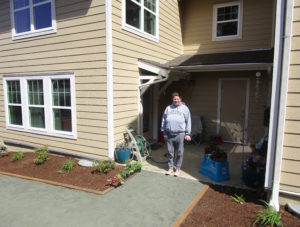
One renter’s story
Whitney Hudson, a single parent with three young sons, is renting one of the project’s two, three-bedroom apartments. The Lakeview, Ore. native moved to Yachats to be closer to her childrens’ grandparents in Waldport.
Hudson pays $743 a month for her two-story apartment, which looks over a community pavilion, garden area and grass. She appreciates the numerous windows that bring in light and the secluded, ground-level porch.
“It’s a low-income place but they went above and beyond with the design, the fixtures, the cupboards, cabinets and appliances,” Hudson said. “It’s very spacious. The units are very quiet. At night you can hear the ocean.”
Project has roots in Yachats vacation
Morrill is an accidental developer.
He’s been an attorney in Phoenix for 43 years, specializing in business and tax law. In 2004 he visited Yachats on a family vacation, built a home in 2007 and has spent summers and falls here since.
In 2007 Morrill purchased 23 acres of land between U.S. Highway 101 and the hillside to the east. In 2008 he sold the undeveloped plot along what is now Diversity Drive to Cascade Housing Group, which built and now manages the Fisterra Garden apartments. It too is a low-income housing development.
Although they share the same street, Fisterra Garden Townhomes is an entirely different project.
“As that project came along I became more interested in low-income housing,” he said.
He and his wife, Elizabeth, formed Our Coastal Village in 2009 and four years later finished the seven-unit Aqua Vista Square project along Highway 101 farther south.
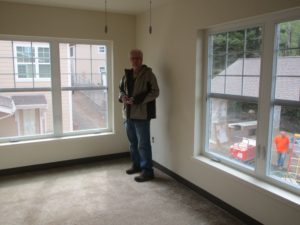
Morrill says when Aqua Vista finished he figured he’d tackle another low-income housing project “but not one this large.”
Financing the $6 million project is a complex mix of equity, donations, loans and state tax credits.
Our Coastal Village has $1.96 million in the project, which includes large grants from four charitable foundations in Oregon and Arizona and money from investors. A private finance company is investing $2.3 million that it is able to sell to institutions for income tax credits.
Oregon Housing and Community Services provided a 30-year, zero-interest $800,000 loan as part of a four-year-old state effort to build more low-income housing in rural areas. Washington Federal Savings Bank purchased $2.17 million in state-issued bonds for construction and will administer a $850,000 permanent loan.
While Lincoln County was only able to contribute $10,000 to the project, Morrill said it has been “a big supporter.” The city of Yachats agreed to a 30-year installment payment on half of the city’s $98,000 in system development charges.
The 2015 Legislature started an affordable housing program for low-income families by authorizing $40 million in general obligation bonds. It doubled the bond for 2017-19. The Housing and Community Services agency is asking the 2019 Legislature for $130 million to continue to expand the program.
“The fact that Fisterra is rented out and has a waiting list speaks to the need, especially in rural areas,” Nicole Stoenner, legislative and communications coordinator for the agency, told YachatsNews.com.
A study by the state and another by Morrill shows the need for 120 to 140 more low-income units in Lincoln County.
Oregon’s program funded 1,259 new low-income units statewide in 2018-19, requiring projects be split 50-50 between urban and rural areas.
But finding developers able or willing to tackle low-income projects in rural areas can be difficult, Stoenner said, so the agency is experimenting with a program that links an urban developer with a rural project. It has one developer doing a project in east Portland and Hermiston, for example.
“There are just so few developers of low-income housing around here,” Morrill said.

The apartments
The 21 units of Fisterra Garden Townhomes are shoehorned onto just an acre of land – yet still there is a covered community pavilion with built-in barbecues, a sloping patch of grass, greenhouse and six raised garden beds.
“It was important to me to make it more of a community,” Morrill said. “We managed to put 21 units on (the site) and still have a pretty neat backyard.”
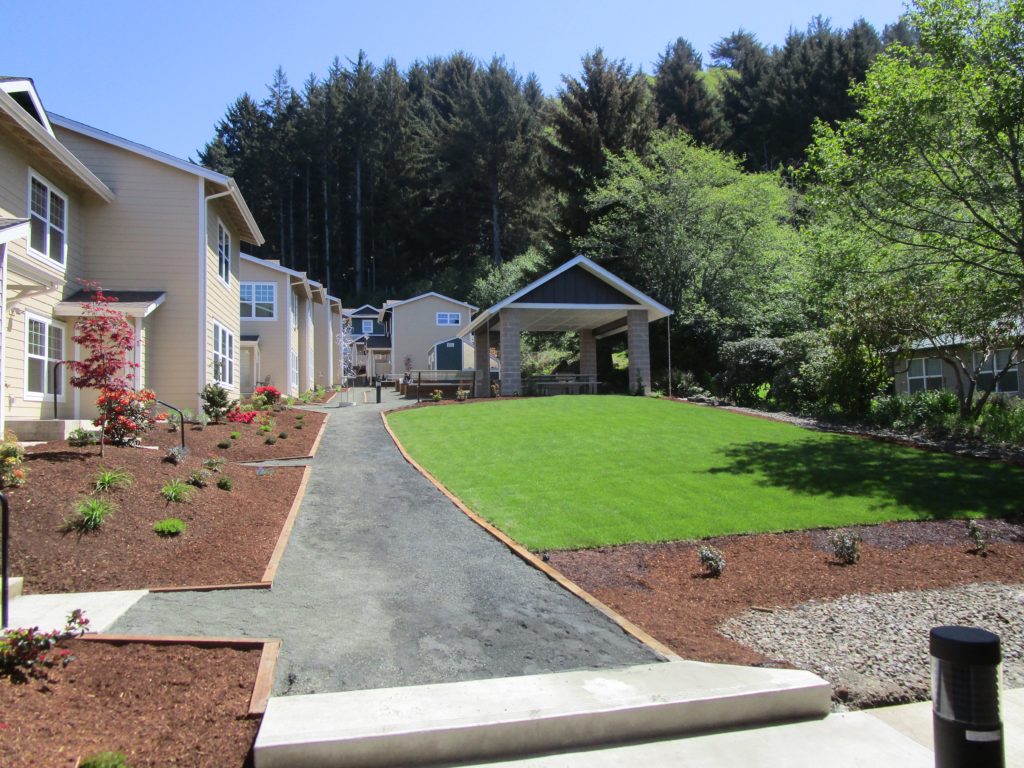
There are six studio apartments, three one-bedroom units, 10 two-bedroom units and two three-bedroom units. Five units have single-car garages.
All the units are set aside for households earning at or under 60 percent of the area’s median income, ranging from $22,980 for one person to $32,820 for a four-person household.
Rents range from $495 for a 328-square-foot studio to $743 for a three-bedroom 1,219-square-foot apartment. Water, sewer and trash removal are included.
What makes the Yachats project unique among state-approved projects, however, is a “local preference” for families with children living in or one person working in Yachats’ 97498 Zip code.
It has long been an issue among tourism-related businesses in the Yachats area that housing for their typically low-wage, seasonal employees was difficult to find and afford.
When the adjacent Fisterra Gardens opened in 2009, Morrill said, most of its renters came from other parts of Oregon or the country.
Morrill said getting the state to go along with the local preference was difficult because of its worry about violating fair housing regulations. Of the 47 state-funded low-income projects around Oregon, Fisterra Townhomes is the only one giving preference to local families.
“They were opposed to it and dug in their heels,” Morrill said. “My goal was to get units for locals … they finally agreed.”
As a result, Morrill said, 13 of the 21 Fisterra Townhome renters qualified under the local preference.
“The zip code preference is unusual and special in this case,” Stoenner said.
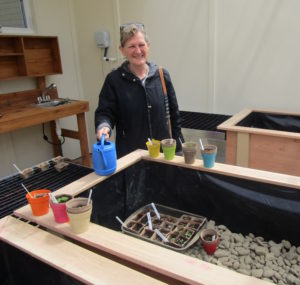
One local’s story
The local preference worked for Lois Ruane, who moved into her one-bedroom apartment Jan. 1.
Ruane moved from California to Yachats last May, rented space in a family member’s garage and quickly found a job at the Overleaf Lodge.
She heard about the Fisterra Townhomes project, got on the waiting list “and stayed on top of it,” Ruane said. Her rent is $536 a month.
She already has vegetables sprouting in the greenhouse and a staked claim to a raised bed so she can grow her own spinach, beets, kale and chard this summer.
“It’s amazing,” Ruane said. “I’ve always wanted something like this. I love it.”
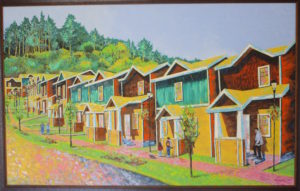
Grand Opening Celebration:
Where: Fisterra Gardens Townhomes, 100-A Diversity Drive, Yachats
Who: Our Coastal Village Inc. and Oregon Housing and Community Services
When: 2 p.m. Thursday, May 9


